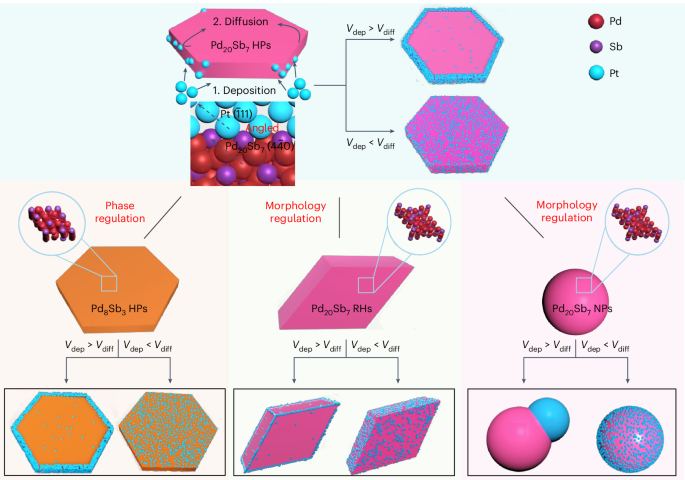Mitchell, S. et al. Nanoscale engineering of catalytic supplies for sustainable applied sciences. Nat. Nanotechnol. 16, 129–139 (2020).
Guan, Q. et al. Bimetallic monolayer catalyst breaks the exercise–selectivity commerce−off on steel particle measurement for environment friendly chemoselective hydrogenations. Nat. Catal. 4, 840–849 (2021).
van der Hoeven, J. E. S. et al. Unlocking synergy in bimetallic catalysts by core−shell design. Nat. Mater. 20, 1216–1220 (2021).
He, T. et al. Mastering the floor pressure of platinum catalysts for environment friendly electrocatalysis. Nature 598, 76–81 (2021).
Chang, J. et al. Enhancing Pd–N–C gasoline cell electrocatalysts by means of fluorination-driven rearrangements of native coordination setting. Nat. Power 6, 1144–1153 (2021).
Oyedele, A. D. et al. PdSe2: pentagonal two-dimensional layers with excessive air stability for electronics. J. Am. Chem. Soc. 139, 14090–14097 (2017).
Li, Y. et al. Anomalous resistive switching in memristors based mostly on two-dimensional palladium diselenide utilizing heterophase grain boundaries. Nat. Electron. 4, 348–356 (2021).
Sancho-Albero, M. et al. Most cancers-derived exosomes loaded with ultrathin palladium nanosheets for focused bioorthogonal catalysis. Nat. Catal. 2, 864–872 (2019).
Sebastian, V. et al. Nondestructive manufacturing of exosomes loaded with ultrathin palladium nanosheets for focused bio-orthogonal catalysis. Nat. Protoc. 16, 131–163 (2021).
Chen, Z. et al. Bioorthogonal catalytic patch. Nat. Nanotechnol. 16, 933–941 (2021).
Novoselov, Okay. S., Mishchenko, A., Carvalho, A. & Castro Neto, A. H. 2D supplies and van der Waals heterostructures. Science 353, aac9439 (2016).
Lu, Q. et al. Crystal part–based mostly epitaxial progress of hybrid noble steel nanostructures on 4H/fcc Au nanowires. Nat. Chem. 10, 456–461 (2018).
Zhai, L. et al. Epitaxial progress of extremely symmetrical branched noble metal-semiconductor heterostructures with environment friendly plasmon-induced hot-electron switch. Nat. Commun. 14, 2538 (2023).
Mistry, H., Varela, A. S., Kühl, S., Strasser, P. & Cuenya, B. R. Nanostructured electrocatalysts with tunable exercise and selectivity. Nat. Rev. Mater. 1, 16009 (2016).
Seh, Z. W. et al. Combining idea and experiment in electrocatalysis: insights into supplies design. Science 355, eaad4998 (2017).
Yang, Y. et al. Steel floor and interface power electrocatalysis: fundamentals, efficiency engineering, and alternatives. Chem 4, 2054–2083 (2018).
Luo, M. & Guo, S. Pressure-controlled electrocatalysis on multimetallic nanomaterials. Nat. Rev. Mater. 2, 17059 (2017).
Xu, Q. et al. Atomic heterointerface engineering overcomes the exercise limitation of electrocatalysts and guarantees highly-efficient alkaline water splitting. Power Environ. Sci. 14, 5228–5259 (2021).
Park, J. et al. Flattening bent Janus nanodiscs expands lattice parameters. Chem 9, 948–962 (2023).
Bu, L. et al. Biaxially strained PtPb/Pt core/shell nanoplate boosts oxygen discount catalysis. Science 354, 1410–1414 (2016).
Li, M. et al. Ultrafine jagged platinum nanowires allow ultrahigh mass exercise for the oxygen discount response. Science 354, 1414–1419 (2016).
Zhao, M. et al. Selective epitaxial progress of oriented hierarchical steel–natural framework heterostructures. J. Am. Chem. Soc. 142, 8953–8961 (2020).
Huang, L. et al. Regioselective deposition of metals on seeds inside a polymer matrix. J. Am. Chem. Soc. 144, 4792–4798 (2022).
Zhuang, T. et al. Regioselective magnetization in semiconducting nanorods. Nat. Nanotechnol. 15, 192–197 (2020).
Steimle, B. C. et al. Rational development of a scalable heterostructured nanorod megalibrary. Science 367, 418–424 (2020).
Oh, M. H. et al. Design and synthesis of multigrain nanocrystals by way of geometric misfit pressure. Nature 577, 359–363 (2020).
Chen, L. et al. Improved ethanol electrooxidation efficiency by shortening Pd–Ni lively website distance in Pd–Ni–P nanocatalysts. Nat. Commun. 8, 14136 (2017).
Zhang, Y. et al. Atomically remoted Rh websites inside extremely branched Rh2Sb nanostructures improve bifunctional hydrogen electrocatalysis. Adv. Mater. 33, e2105049 (2021).
Zhou, M. et al. Enchancment of oxygen discount efficiency in alkaline media by tuning part construction of Pd–Bi nanocatalysts. J. Am. Chem. Soc. 143, 15891–15897 (2021).
Lide, D. R. et al. CRC Handbook of Chemistry and Physics ninetieth edn, 9–68 (CRC, 2010).
Wang, C. et al. Side-controlled synthesis of platinum-group-metal quaternary alloys: the case of nanocubes and 100 sides. J. Am. Chem. Soc. 145, 2553–2560 (2023).
Qiu, X. et al. Twin proliferation and prolongation underneath kinetic management: Pd–Au Janus icosahedra versus Pd@Au core–shell starfishes. J. Am. Chem. Soc. 145, 13400–13410 (2023).
Harada, M. & Katagiri, E. Mechanism of silver particle formation throughout photoreduction utilizing in situ time-resolved SAXS evaluation. Langmuir 26, 17896–17905 (2010).
Li, J. & Deepak, F. L. In situ kinetic observations on crystal nucleation and progress. Chem. Rev. 122, 16911–16982 (2022).
Lu, N., Wang, J., Xie, S., Xia, Y. & Kim, M. J. Enhanced form stability of Pd–Rh core–body nanocubes at elevated temperature: in situ heating transmission electron microscopy. Chem. Commun. 49, 11806–11808 (2013).
Gilroy, Okay. D. et al. Bimetallic nanocrystals: syntheses, properties, and purposes. Chem. Rev. 116, 10414–10472 (2016).
Kwon, S. G. et al. Heterogeneous nucleation and form transformation of multicomponent metallic nanostructures. Nat. Mater. 14, 215–223 (2015).
Lin, M. et al. One-pot heterointerfacial metamorphosis for synthesis and management of extensively various heterostructured nanoparticles. J. Am. Chem. Soc. 143, 3383–3392 (2021).


